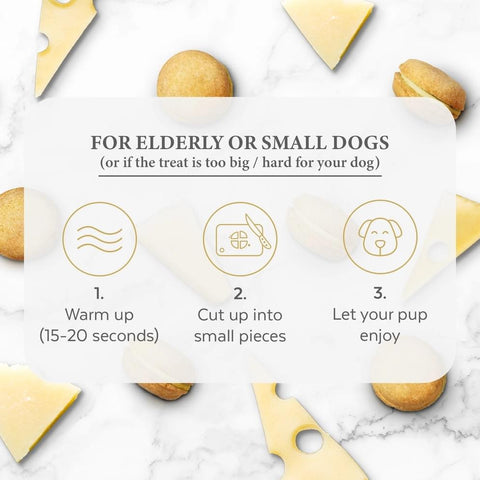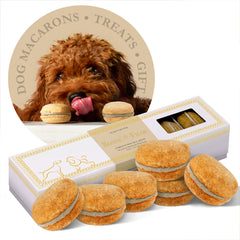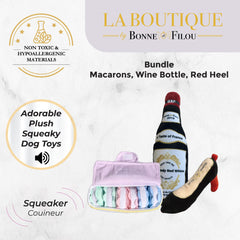Nutrition Tips for a Healthy Dog: Choosing the Perfect Treats
The Ultimate Guide to Choosing Premium Treats
When it comes to our furry companions, providing them with a nutritious diet that caters to their health and happiness is a top priority for every dog owner. Beyond their regular meals, treats play a significant role in a dog's life - from training rewards to a simple gesture of love. However, with an overwhelming array of options, selecting the right treats that are delicious yet beneficial can be daunting. In this guide, we'll dive into the world of the best dog treats, focusing on everything from gourmet special occasion dog treats to dental sticks, and how you can make informed decisions to promote the well-being of your beloved pet.
Table of Contents
- Understanding the Importance of Healthy Treats
-
Diverse Delights for Every Dog's Needs
- Gourmet Dog Treats and Human-Grade Dog Treats
- Organic Dog Treats and Grain-Free Dog Snacks
- Freeze-Dried Dog Treats and Soft Dog Treats
- Dental Bones and Dental Sticks
- Limited Ingredient Treats and Meaty Snacks
- Puppy Training Treats and Canine Rewards
- Innovative Treat Ideas
-
Tips for Choosing and Using Dog Treats
- Read Labels Carefully
- Consider Your Dog's Dietary Needs
- Use Moderation
- Variety is Key
- Homemade Options
-
Catering to Specific Health Needs with Dog Treats
- The Role of Treats in Training and Behavior Modification
- Homemade Treats
- Incorporating Treats into a Balanced Diet
- Conclusion
Understanding the Importance of Healthy Treats
Before we explore the different types of treats, it's crucial to understand why choosing the right treats is important. Treats should not only satisfy your dog's taste buds but also contribute to their overall health. Opting for treats like human-grade dog treats, organic dog treats, and grain-free dog snacks can ensure that you're offering high-quality, nutritious options free from unnecessary fillers and artificial additives.
Diverse Delights for Every Dog's Needs
Gourmet Dog Treats and Human-Grade Dog Treats
These treats are often made with superior quality and natural finest ingredients that are deemed fit for human consumption. Incorporating gourmet treats or human-grade options into your dog's diet can add an extra layer of quality and safety, ensuring that your dog is consuming treats that are free from harmful preservatives and chemicals.
Organic Dog Treats and Grain-Free Dog Snacks
For dogs with sensitive stomachs or allergies, organic and grain-free options can be a godsend. Organic treats are made without synthetic pesticides, fertilizers, and genetically modified organisms (GMOs), while grain-free snacks eliminate common allergens like wheat, corn, and soy, making them easier on your dog's digestive system.
Buy Dog Macarons Treats Gifts 6 Count Now!
Freeze-Dried Dog Treats and Soft Dog Treats
Freeze-dried treats retain most of the nutrients of fresh ingredients, offering a burst of flavor and nutrition in a convenient form. Soft dog treats, on the other hand, are perfect for older dogs or those with dental issues, as they are easier to chew and digest.
Dental Bones and Dental Sticks
Oral health is paramount for dogs, and incorporating dental treats like bones and sticks can help reduce plaque and tartar buildup, promoting healthier teeth and gums. These treats are designed to be chewed for longer periods, providing mechanical cleaning action against dental debris.
Limited Ingredient Treats and Meaty Snacks
Limited ingredient treats are ideal for dogs with food sensitivities, as they contain fewer components that could trigger allergic reactions. Meaty snacks, rich in protein, offer a savory delight while contributing to muscle maintenance and overall health.
Puppy Training Treats and Canine Rewards
Training treats are specifically designed to be small and low in calories, perfect for repetitive use during training sessions without the risk of weight gain. They act as excellent motivational tools and can strengthen the bond between you and your pup.
Innovative Treat Ideas
In addition to the traditional options, the market is brimming with innovative treats designed to cater to specific needs:
For those special occasions, dog macarons offer a festive way to celebrate with your furry friend. These treats are made with dog-safe ingredients and provide a unique texture that dogs love.
Tips for Choosing and Using Dog Treats
Read Labels Carefully
Look for treats with whole food ingredients and avoid those with artificial colors, flavors, or preservatives. The fewer the ingredients, the better, especially for dogs with sensitivities.

Consider Your Dog's Dietary Needs
Choose treats that complement your dog's regular diet. If your dog is on a special diet due to health issues, seek treats that align with their nutritional requirements.
Use Moderation
Treats should only make up about 10% of your dog's daily calorie intake to avoid weight gain and nutritional imbalances.
Variety is Key
Offering a range of treats can keep your dog interested and cater to their nutritional needs more broadly. Mixing in treats like dental bones or freeze-dried dog treats can provide added health benefits.
Homemade Options
For those who love DIY, making your dog treats at home can be a rewarding way to ensure your dog is getting wholesome, healthy snacks. There are plenty of simple recipes online that use minimal, healthy ingredients.
Treats are more than just tokens of affection; they're tools for training, components of dental health, and supplements to your dog's diet. By choosing wisely and focusing on treats like gourmet dog treats, dental sticks, and limited ingredient treats, you can support your dog's health, happiness, and longevity. Remember, the best treat for your dog is one that suits their individual health needs, taste preferences, and contributes to their overall well-being.
In the realm of dog nutrition and well-being, the choice of treats plays a pivotal role in ensuring that our furry friends lead a healthy, joyful life. As we've explored a variety of treats—from gourmet and human-grade to dental and training treats—it's clear that the perfect treat does more than satiate; it enhances health, reinforces good behavior, and deepens the bond between pet and owner. Let's delve deeper into how specific treats can cater to various health concerns and lifestyle needs, ensuring every tail wag is one of happiness and health.
Catering to Specific Health Needs with Dog Treats
- Weight Management
Obesity in dogs is a growing concern, mirroring the human struggle with the condition. To combat this, low-calorie treats, such as crunchy soft macarons and freeze-dried vegetables, can be a godsend. These treats allow owners to reward their pets without the guilt or health risks associated with excessive calorie intake.
- Allergies and Sensitivities
As awareness of canine allergies increases, the demand for specialized treats has risen. Grain-free dog snacks and limited ingredient treats have become staples for sensitive dogs, offering peace of mind to owners concerned about triggering an allergic reaction.
- Joint Health
For breeds prone to joint issues or older dogs facing the inevitable challenges of age, treats infused with glucosamine and chondroitin can provide much-needed relief. These functional additives support joint health, making each treat not just a tasty snack but a part of your dog’s health regimen.
The Role of Treats in Training and Behavior Modification
Treats are invaluable tools in training and behavior modification. The strategic use of puppy training treats and canine rewards can significantly enhance learning and obedience. Here's how:
- Positive Reinforcement
Small, tasty treats like soft dog treats or puppy snacks are perfect for training sessions. They offer immediate gratification for good behavior, reinforcing the desired action in your dog's mind.
- Focus and Motivation
High-value treats, such as meaty snacks or gourmet dog treats, can capture a dog's attention and keep them motivated during training sessions, even in distracting environments.
- Behavioral Training
For more challenging behavior modifications, such as crate training or reducing anxiety, using specialized treats like calming bites or long-lasting tasty dog chews can provide comfort and distraction, aiding in a smoother training process.
Homemade Treats
- A Personal Touch in Canine Nutrition
While the market offers an expansive selection of treats, making your own dog treats at home can be a fulfilling way to ensure your dog is enjoying fresh, wholesome snacks. Here are a few ideas:
- Vegetable and Fruit Snacks
Simple, dehydrated slices of sweet potato, apple, or carrot make for crunchy, healthy dog snacks that are low in calories and high in fiber.
- Special Diet Treats
For dogs on special diets, home-prepared treats allow you to tailor ingredients to your dog’s specific needs, whether it's low-fat, grain-free, or limited ingredient snacks.
Incorporating Treats into a Balanced Diet
Understanding that treats are supplements to your dog’s main diet is crucial. Here's how to integrate treats responsibly:
- Caloric Allocation
Ensure that treats do not exceed 10% of your dog’s daily caloric intake to maintain a balanced diet and prevent obesity.
- Nutritional Balance
Choose treats that complement your dog's meals, whether it's adding variety, addressing nutritional gaps, or providing extra support for specific health needs.
- Regular Monitoring
Keep an eye on your dog’s weight, energy levels, and overall health. Adjust treat types and quantities as needed, in consultation with your vet.
Key Takeaways
RELATED BLOG:
These Fall Favorites Could Have A Negative Effect On Your Dogs Health


